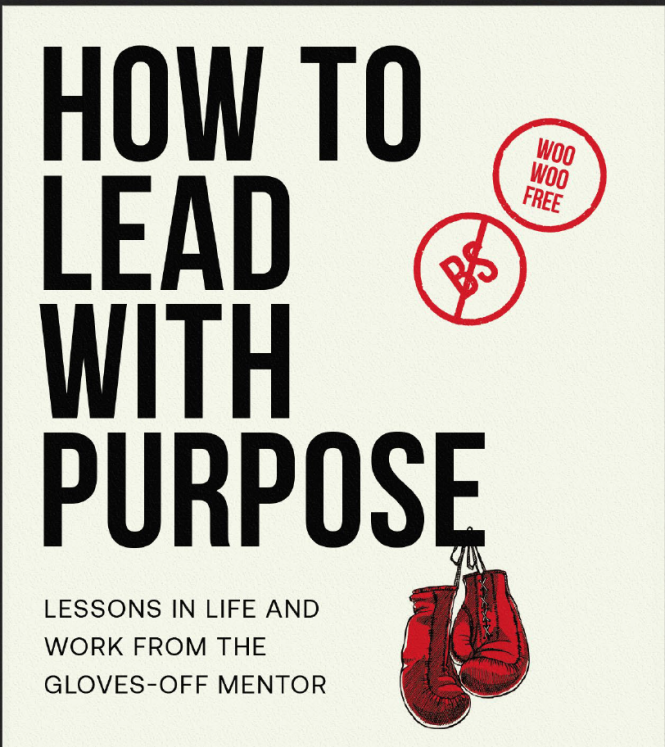A year or so after I had jumped from (un)comfortable employment into the cavern of self-employed uncertainty, I benefited from a few sessions of Liam Black’s gloves off mentoring.
We talked about pricing, career arcs, what I wanted my retirement to look like (I’d never given that any thought), Imposter Syndrome and my ‘Purpose’. Four years on, as I look back at my naiveté in those conversations, I cringe just like Elsa at the end of Frozen 2.

But that’s a sign of growth. I think.
I admire Liam’s ‘loving boot’ approach greatly and will take inspiration from it into my leadership and communications coaching… more on that soon.
Best bits
Here are my personal best bits from Liam’s book. Buy it, read it. It’s pithy, provoking and funny.
On purpose-washing
“‘Sustainababble’: The verbiage produced by corporate marketing teams to distract from the truth that very little of any substance is changing yet.”
Coined by Tariq Fancy, BlackRock’s Chief Investment Officer, 2021
Just don’t. Acknowledge where you are. Say nothing if you’ve got nothing of note to say.
On work-life ‘balance’
“‘Is it really possible’, Caroline asked me, ‘to change the world and be home in time to change the nappies?’ These conversations are where noble world-changing visions and the grind of domestic relationships collide (especially for women).”
A pithy articulation of a question I’ve asked myself many times. Disappointingly (but understandably), the book leaves this question unanswered.
I asked Liam (and a friend, Cleo) about it and we surmised, “no”. Or, “maybe”, if you take your baby to work. “Maybe”, if you have another person to rely on as carer and housekeeper.
I’m a feminist, but sometimes I daydream about the simplicity of 1950s gender roles. (I snap out of it quickly, though).
On Imposter Syndrome
“Everyone has some variant of this imposter drama except for psychopaths and some FTSE CEOs I have had the misfortune to meet.”
It is good to know that I’m in good company, then. Liam’s advice?
Fact-check those voices. Write down all the thoughts going through your head and then rigorously and robustly fact check them. Doing this with someone like a mentor or coach helps, as they can bring the perspective you need but that’s hard to find when the “mind monkeys” are creating a cacophony inside your head.
And, ever practical; “One way of not being found out is to make sure that you are bloody well on your game when you need to be”.
On culture change
“Most leaders know what is required to change a culture but have had the courage and staying power knocked out of them. Relentless incremental change is what can get you there. Beware the grandiose innovation plan”
Sir Martin Narey
This is becoming more and more clear to me as I work with different organisations. It’s the reason I have some clients that I’ve worked with for years. It’s also why I have trained as a coach. No culture change strategy will get off the ground without the leaders who create the climate committing to it.
On organisational values:
“The business had some great HR policies about leadership values and behaviours, innovation and so on. These clearly hadn’t been sent to the CEO, and he’d obviously missed the group hug leadership courses… Kevin was experiencing in acute form the gulf between a company’s stated values and the actual behaviour of the senior leadership team.”
At the book launch, Liam was asked if he’d ever experienced a company where the leaders behaved in line with the organisation’s ‘values’. “No”.
Aside from this obvious hypocrisy, there’s another reason I dislike the term ‘values’ in an organisational setting. Values are personal, formed in childhood, and incredibly hard (but not impossible) to shift. We can’t expect even the best-intentioned of leaders to ‘put on’ new values every time they join a new organisation. That’s why I much prefer ‘behaviours’ or ‘principles’. These are things you can do at a behavioural level, not who you are at an identity level.
On diversity:
Liam offers a blistering critique on what it’s like to navigate “the theatre of performative male ego” as a senior woman in many businesses. It’s a brave, and probably unpopular view. But…
“I will use whatever male privilege I have to call out the appalling state of affairs so many women in leadership have to put up with.”
Thank you, Liam. Belters include:
“’Yes we need more women, of course we do, and black people too, but we can’t level down, we must only recruit top talent’. The assumption being made here – which I am always expected to agree with – is that leadership teams and boards are just bursting with fabulously talented middle-aged guys who have made it there solely because of their dazzling skills and unmatched business success and wisdom. Well, sorry lads, but having spent 20 years and more in and out of exco and board meetings, I have rarely been dazzled.”
Ouch.
On keeping on:
“Our efforts seem so trivial, pathetic, in face of what’s happening but we can’t give up Liam. I can’t stop Putin but I won’t let him stop me. I can’t change the world probably but I can change the bit I’m in. We double down old man, we double down.”
Cath, Liam’s Mentee
“Pessimism, as poet Salena Godden wrote, is for lightweights.”
Here’s to doubling down.
